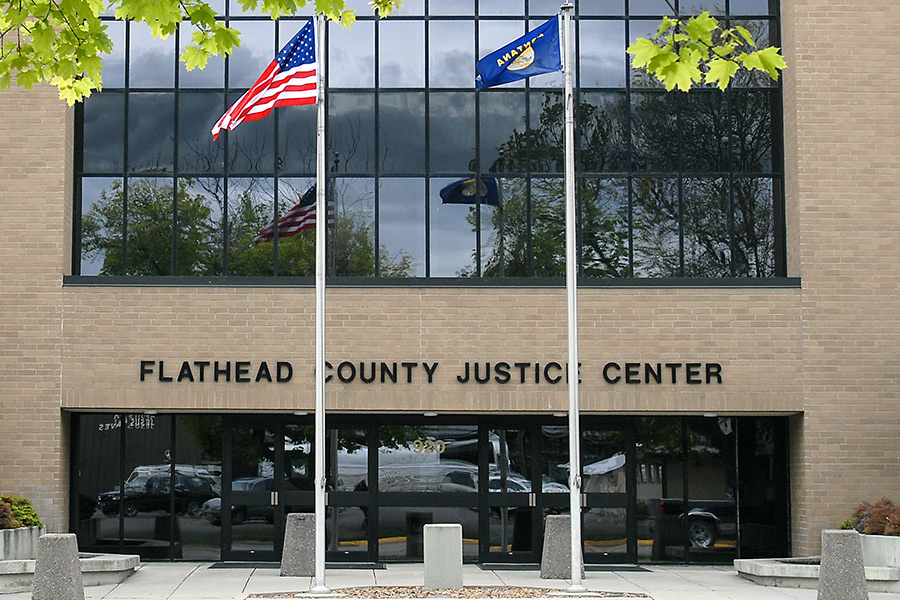The sound emanating from a courtroom tends to have a familiar tone, one punctuated with stern voices and legalese. But the proceedings in Courtroom 2 in the Flathead County Justice Center last week had a different sound, one marked with laughter, encouragement and applause — a lot of applause.
“Is there anything else we can help you with this week?” Judge Heidi Ulbricht asked a woman sitting at what normally would be the defendant’s table.
“No, I’m doing well,” the woman said.
“Well, it looks like you had a good two weeks,” Ulbricht said with a smile before kicking off a chorus of clapping that filled the entire courtroom.
That’s how most hearings end in Flathead Family Treatment Court, a new court run by Ulbricht that focuses on treatment rather than punishment for parents who are struggling with addiction and who have had their kids removed from the home by the state. The treatment court was established in 2019 thanks to a $600,000 grant from the U.S. Department of Justice, and on Feb. 12, the first participant graduated from the program.
According to court officials, 150 children were removed from their parents’ care in Flathead County in 2017; 120 of those removals were the result of drug use in the home.
Participation in the program is voluntary. Instead of going through the normal legal system when their child is removed, which can takes considerably longer, the parent or parents have the opportunity to go into the treatment court where they have to appear before Judge Ulbricht every two weeks to show they are making progress in treating their addiction and becoming better parents. During their time in the program, the parents have to prove they’ve completed requirements like attending a treatment program or a parenting course. If they do, they are rewarded.
Ulbricht oversees the new court with assistance from the Montana Department of Justice, the Office of the State Public Defender, the Child and Family Services Division of the Montana Department of Public Health and Human Services, Court Appointed Special Advocates (CASA) and local treatment providers.
Before each hearing, Ulbricht gathers the team to talk about each case — currently there are 13 adults participating in the treatment court.
Ulbricht said the treatment court places emphasis on helping the parents deal with their addiction problems before getting custody of their kids back. As they progress with their addiction, they get more and more parenting time. In one instance during a recent treatment court hearing, a parent was rewarded for attending her required classes with a gift card to a movie theater so she could take her children for an unsupervised night out.
The first graduate of the program, a 24-year-old from the Kalispell area, entered the program after her children were taken away for the second time in two years because of methamphetamine use. Prior to being in the treatment court system, the woman, who the Beacon has agreed not to identify, said she struggled with addiction because so many people in her social circle used drugs. The woman said that the treatment court system gave her the tools to leave that life behind and handle her addiction once and for all.
“This program really works,” she said. “My kids are just too important to me and I can’t go back to that lifestyle I was previously living.”
The woman said one of her favorite parts of the program was that seeing the judge every two weeks kept her on track toward graduation.
Last week, at the end of the normal treatment court calendar, the woman was honored with a graduation ceremony and party. The normally drab courtroom — lined with wood paneling basking in a dull, yellow light — was brightened by the presence of pink streamers, red balloons, cake and other treats to celebrate the achievement. Other treatment court participants were encouraged to stay and celebrate to see what they were working toward.
“You picked a good day to come to court,” Ulbricht said to the child of one of the participants, gesturing to the table of goodies. “You see what’s going on over here?”
Before the cake was cut, Ulbricht announced that the woman was officially done with the program and gave her a diploma. Afterwards, Ulbricht came off the bench and gave the woman a hug. The judge said the first graduation proved that all of the hard work to get the court up and running had paid off.
“I’m so proud,” she said. “Now she can be a mother again.”
